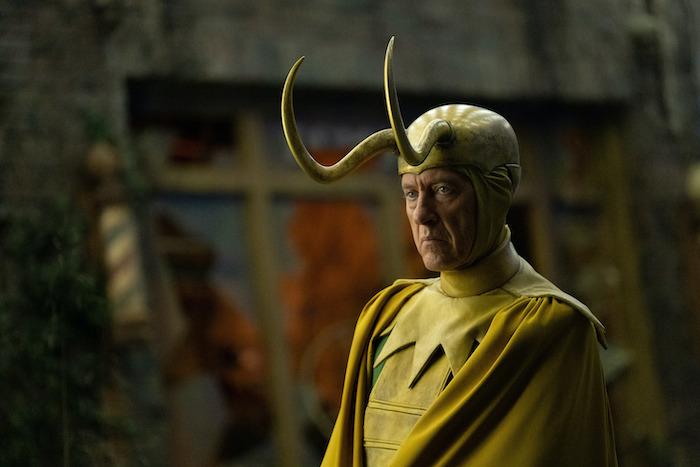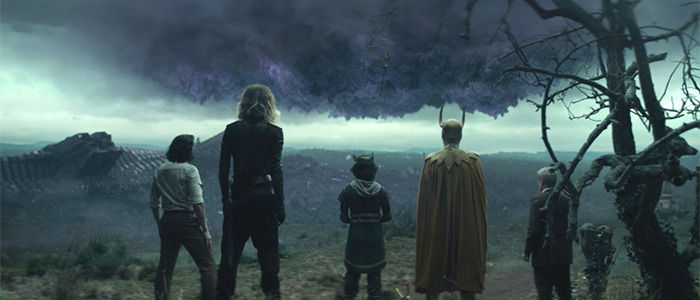How 'Loki' Head Writer Michael Waldron Used The Latest Episode To Rewrite The Events Of 'Avengers: Infinity War'
Spoilers below for episode 5 of Loki.
No episode of Loki is more deserving of the series title than episode 5, "Journey Into Mystery," which features more Loki's than the God of Mischief himself can count. They come in all shapes and sizes now, including a child and yes, an actual alligator. And despite their distinctive nexus events and considerably different lives, even these new Loki's provide insight into the enigmatic figure at the heart of the show.
Alongside the many Variant versions of himself, Tom Hiddleston's Loki manages to escape the Alioth, the cloud-lion entity devouring everything the inhabitants of the Void. In a charming bunker that provides them temporary shelter, the mismatched group of Loki's slowly get acquainted, sharing the nexus events that got them picked up and banished by the TVA. The revelation that Kid Loki (Jack Veal) killed Thor is sobering, especially in comparison to the Alligator Loki's story of eating the wrong neighbor's cat. But the most revealing tale comes from Richard E. Grant's Classic Loki, who ultimately lives the life closest to the Loki we know and love.
The Tragic Tale of Classic Loki
As Classic Loki tells himselves, everything proceeded just as it was meant to up until Thanos' attack. These are the events we witness at the beginning of Avengers: Infinity War, when the Mad Titan intercepts the survivors of Asgard, overpowers Thor, and crushes the Tesseract to extract the Space Stone. In the original timeline, Loki offers his services as a guide, pledging himself to Thanos as a deception before making a last-ditch effort to stab the Titan. Not to be fooled, Thanos catches him in the act and kills Loki on the spot.
But when it came to determining backstories for a new group of Variants, Loki head writer Michael Waldron told Marvel.com about a thought experiment he had: "What if Loki did in fact survive the events of Avengers: Infinity War?" He added:
"I thought, 'Well, what if that did happen?” And if it did, in fact, how could he have aged up? How could he have lived out his years in a way that the TVA would never come find him?"
In the episode, Classic Loki explains that rather than attempt to stab Thanos himself, he used a projection. He cloaked himself as "inanimate debris," and while the projection died in his place, he wandered space in solitude. As he floated, he found time for reflection and considered the harsh reality that pain seemed to follow wherever he went — so he opted to remain alone.
Classic Loki lived out many years in isolation and may have remained, untouched by the TVA and their obsession with the sacred timeline, if not for the weakness of emotion. His loneliness became too much and attempted to leave his planet of solitude, in hopes of reuniting with his brother — only to be stopped in his tracks by the TVA. Waldron said,
"It was that tragic thing where he finally realizes 'I'm meant to be alone.' It is just so sad. There's a real lesson there for our Loki in that he's going to reject that notion — that this tiger can change his stripes, and he refuses to be alone. [Loki] wants to do the right thing. [He] wants to see if he can have real companionship in his life."
Loki’s Hidden Potential
Classic Loki is chock-full of life lessons, as our older selves always are. But thanks to this mess of a timeline, he's able to share them directly without Loki. One of his lessons even takes root by the fifth episode's end. As he tells the tale of escaping Thanos' death grip, our Loki is surprised to learn that this version of himself didn't attempt to stab the Titan. Here, Classic Loki imparts key wisdom: "Blades are worthless in the face of a Loki's sorcery."
He proves as much throughout the episode: first, he saves our gang from the attack of President Loki and his treacherous band of background Loki's. The bunker erupts into chaos as the fighting begins, and with a projection of himself and a helpful portal out, Classic Loki orchestrates their escape. Later, he provides an immense distraction for Alioth, in the form of a projected yet very convincing Asgard. He not only saves Loki and Sylvie from being consumed but reminds the pair of their strength. Together they enchant the beast-like entity.
But power is not all Classic Loki has to give. In sacrificing himself for their plan, he displays yet another change of heart — comparable to his decision to seek out his brother after spending years of life alone. He has so much to prove about Loki's potential, but most importantly, that the God of Mischief can change his ways at any given point in his journey.


